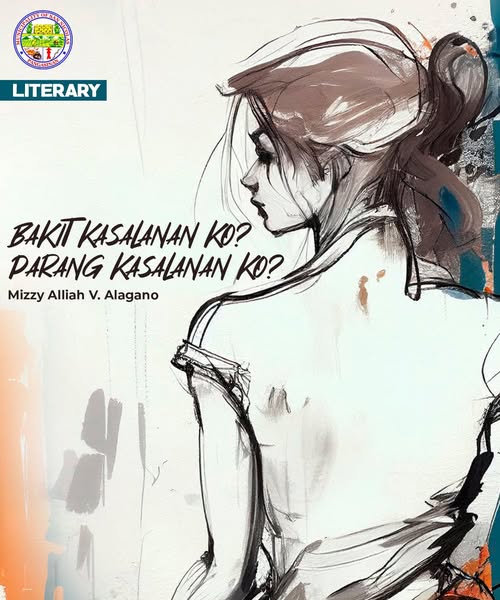𝐌𝐢𝐳𝐳𝐲 𝐀𝐥𝐥𝐢𝐚𝐡 𝐀𝐥𝐚𝐠𝐚𝐧𝐨 𝖔𝖋 𝐁𝐫𝐠𝐲. 𝐒𝐚𝐧 𝐅𝐞𝐥𝐢𝐩𝐞 𝐄𝐚𝐬𝐭
It’s always the same questions, isn’t it? “Ginusto mong i-harass ka kaya nagawa sa’yo,” they say, as if I had a choice in the matter. As if what happened to me was something I wanted—as if anyone wants to be catcalled, followed, or harassed. But that’s the lie they tell to shift the blame, to make it easier for themselves to ignore what really happened. Somehow, the problem isn’t that someone disrespected my space or my safety; it’s what I did or didn’t do to “invite” it.
“Ano bang suot mo?” they ask, like fabric determines how much respect I deserve. Maybe it was the skirt I wore, or the tank top, or maybe even just the fact that I wasn’t covered from head to toe. But since when did clothes give someone permission to take away my comfort, my safety? They don’t. They talk about my body like it’s a weapon I wield against myself. But no matter what I wear, it’s never enough for them. If I wore something too modest, I’d be told I’m exaggerating, overreacting. If I wear anything remotely feminine, I’m told I asked for it. I can’t win. Whether it’s jeans or a dress, I’m still the one at fault.
Then come the comments about my body. “Ang laki kasi ng suso mo.” They say it like I can control that, as if my body shape gives men a free pass to leer and make me feel like I’m less of a person. Like my body justifies their words, their stares. It’s always my body that gets blamed—too big, too small, too curvy, too this, too that. It’s never about the fact that someone thought it was okay to reduce me to just my body in the first place.
“Sumigaw ka ba?” “Bakit hindi ka nagsumbong?” The real question should be, why was I ever in a position to need to scream? But no, they turn it around. As if my silence means I didn’t feel scared enough, or violated enough. As if freezing up when a stranger’s voice cuts through the air is somehow my fault. It’s not that I didn’t scream—it’s that I couldn’t. Sometimes the loudest scream is the one caught in my throat.
“Siguro ang kapal ng makeup mo?” Of course. My face, my makeup, becomes an excuse, too. They don’t see it as self-expression or something that makes me feel good about myself. No, to them, it’s bait—another reason why I was harassed. It’s always something about me. Never mind that harassment happens to women regardless of how we look. They’ll always find something to blame that isn’t the person who did it.
Every time they say these things, it feels like I’m being harassed all over again—not just by the person who whistled or followed me, but by the people who are supposed to understand, supposed to help. “Ginusto mong i-harass ka,” they say. No. What I wanted was to walk down the street without being reminded that my body doesn’t belong to me in their eyes. What I wanted was respect, no matter how I dress, how I look, or how loud I speak.
The truth is, no amount of screaming, reporting, or explaining is enough to change their minds. They’ve already decided it was my fault. Because to them, it’s always the woman who should’ve done something differently. As if I could have stopped the harassment by simply existing less.
But here’s what they won’t say: it doesn’t matter what I was wearing, how I looked, or how I reacted. None of it gave anyone the right to treat me like I was there for their entertainment, for their judgment. The fault lies with the ones who harassed me, not with me. And until they stop asking why I was “asking for it,” and start asking why these men feel so entitled to take what isn’t theirs, nothing will ever change.
But somehow, it always comes back to me—the victim—who did everything wrong. When will they stop asking what I did to deserve it, and start asking why it happened at all?
#Literary#VictimBlaming#BabaeAngatSaLahat#internationalwomensday#womensupportingwomen#EmpoweringMessage#ProtectWomenAtAllCosts#MayorAliciaPrimiciasEnriquez#MayorAliciaPrimiciasEnriquezYourPublicServant#SanNicolasPangasinanMyHomeMyPride

